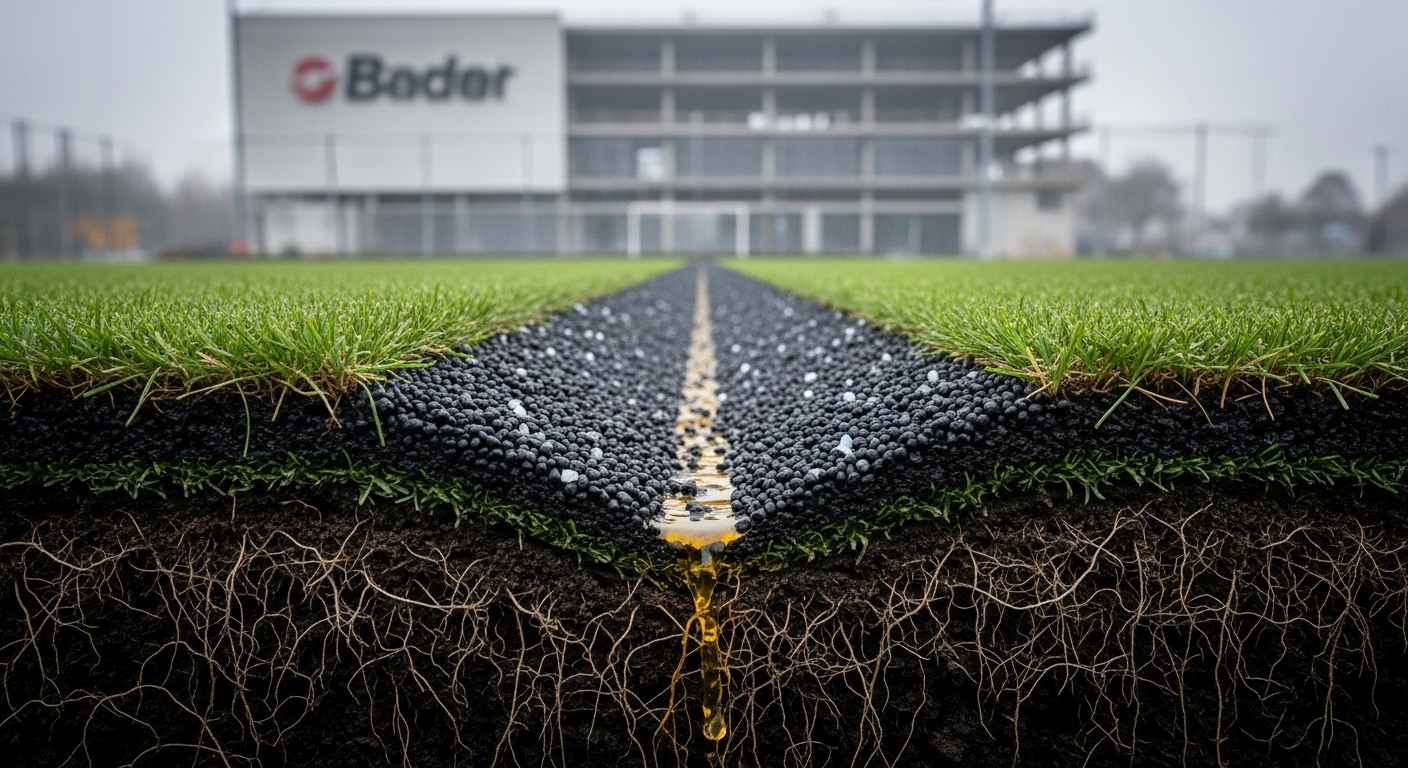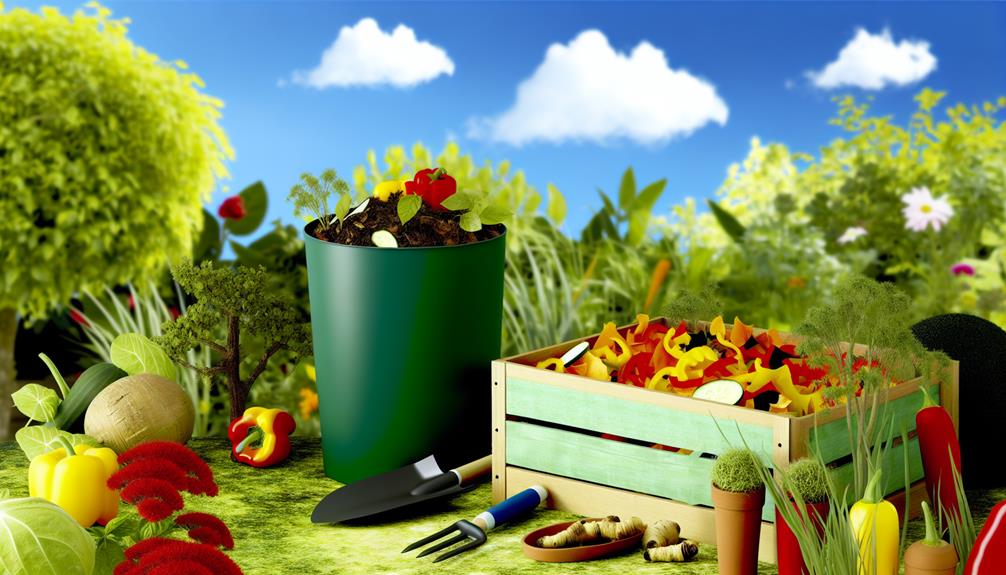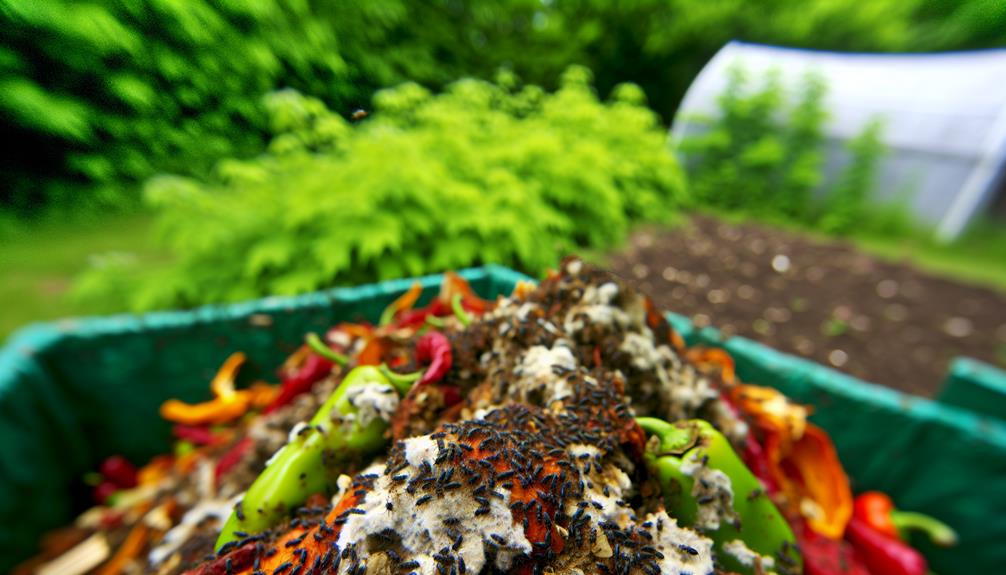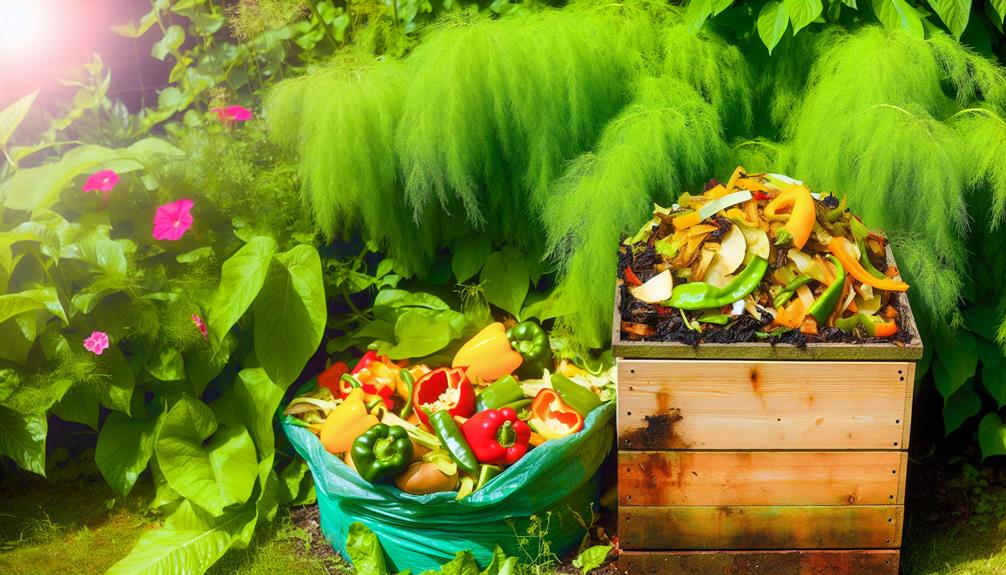

You can definitely compost peppers, be they bell peppers, chili peppers, or jalapeños. Start by cleaning and chopping them into smaller pieces; this speeds up decomposition. Peppers enrich compost with nutrients like nitrogen, potassium, and magnesium, benefiting soil health. However, they can attract pests and decompose slowly if not managed properly.
Bury them deep in your compost and maintain a balanced mix of green and brown materials. Regular aeration and moisture control are essential to avoid foul odors and pest issues. Follow these tips to compost your peppers effectively, and you’ll discover more useful information as you go along.
Peppers come in various types, including bell peppers, chili peppers, and jalapeños. Each type has its own unique characteristics and uses in cooking. Bell peppers are large, sweet, and come in vibrant colors like red, yellow, and green. They’re often used in salads, stir-fries, and stuffed dishes. Their mild flavor makes them a versatile ingredient in many recipes.
Chili peppers, on the other hand, pack a punch with their spiciness. They come in numerous varieties, such as cayenne, serrano, and habanero, each with differing heat levels. Chili peppers are commonly used to add heat and flavor to dishes like curries, salsas, and hot sauces. You’ll find that they’re a staple in many cuisines worldwide, from Mexican to Thai.
Understanding the types of peppers helps you make informed choices in the kitchen and garden. Whether you’re growing bell peppers for their sweetness or chili peppers for their heat, knowing their characteristics allows you to use them effectively in your meals. Plus, it’s useful knowledge when considering their composting potential, as each type can contribute differently to your compost pile.
Incorporating peppers into your compost pile offers numerous benefits for both your garden and the environment. By composting peppers, you contribute to nutrient enrichment in your compost, which in turn enhances soil health.
Peppers decompose relatively quickly, adding essential nutrients like nitrogen, potassium, and magnesium to your compost mix. These nutrients are crucial for plant growth and can greatly improve the fertility of your garden soil.
When you add peppers to your compost, you’re also improving the soil structure. The organic matter from the peppers helps create a more crumbly, aerated soil that retains moisture better and supports beneficial microbial activity. This leads to healthier, more resilient plants that are better equipped to withstand pests and diseases.
Moreover, composting peppers reduces kitchen waste and lowers your carbon footprint. Instead of discarding pepper scraps, you recycle them into a valuable resource for your garden. By doing so, you’re not only nurturing your plants but also contributing to a sustainable gardening practice.
Sharing these practices with your community can foster a sense of belonging as you all work towards a common goal of environmental stewardship and gardening success.
Also Read: Can You Compost Cat Manure?
When you compost peppers, watch out for a few potential issues.

Peppers can attract pests, decompose slowly, and create moisture imbalances in your compost.
To manage these challenges, monitor your compost pile regularly and adjust as needed.
One potential issue with composting peppers is that their scent can attract pests such as rodents and insects. This can lead to an insect infestation or rodent attraction, both of which are undesirable for your compost pile and garden.
To mitigate these risks, you should take certain precautions. First, always bury pepper scraps deep within the compost pile. This reduces the scent that can attract pests. Use a shovel to mix the peppers into the central part of the pile, guaranteeing they’re well-covered by other compost materials. This helps mask the odor and makes it less likely to attract unwanted visitors.
Second, maintain a balanced compost pile. Make sure you have a good mix of greens (like kitchen scraps) and browns (like leaves and cardboard). A well-balanced pile decomposes efficiently and generates heat, which can deter pests.
Peppers can decompose slowly in compost piles, potentially hindering the overall composting process. This can be frustrating, especially when you’re aiming for a rich, quick turnaround in your compost. One reason for this sluggish decomposition is temperature fluctuations. When temperatures vary too much, it negatively affects microbial activity, which is essential for breaking down organic matter.
To better understand the impact, consider this:
| Issue | Impact on Composting | Emotional Response |
|---|---|---|
| Temperature Fluctuations | Slows microbial breakdown | Frustration |
| Dense Pepper Skins | Longer decomposition time | Impatience |
| Inconsistent Microbial Activity | Uneven compost quality | Disappointment |
| Reduced Aeration | Slower composting process | Helplessness |
| Nutrient Imbalance | Poor compost results | Concern |
When the temperature drops, microbial activity slows down, making it harder for peppers to break down efficiently. Dense pepper skins also add to the problem, as they take longer to decompose compared to softer organic materials. Reduced aeration and nutrient imbalances further complicate the process.
A moisture content imbalance can wreak havoc on your compost pile, making it difficult for peppers to break down efficiently. Proper moisture control is crucial to make sure that your compost doesn’t become too wet or too dry, both of which can stall the decomposition process.
Let’s look at three key aspects to manage water retention effectively:
Also Read: Can You Compost Cardboard Tubes?
To prepare peppers for composting, start by thoroughly cleaning them to remove any pesticides or dirt.
Next, chop the peppers into smaller pieces to speed up the decomposition process.
When preparing peppers for composting, make sure to remove any stickers and wash off dirt or pesticides. It’s crucial to start with clean produce to prevent introducing contaminants into your compost.
Begin by rinsing the skins of the peppers thoroughly under cold water. This step guarantees that any residual chemicals or soil are removed, making your compost healthier and safer.
After rinsing, focus on removing seeds from the peppers. Seeds can take longer to break down in compost and may even sprout, leading to unintended pepper plants. To remove the seeds, simply cut the pepper open and scrape them out with a spoon or your fingers.
Here’s a quick checklist to follow:
Once the peppers are clean and de-seeded, chop them into small pieces to expedite the composting process. Using a cutting board and a sharp kitchen knife, slice the peppers into manageable chunks. Smaller pieces decompose faster, making your compost more effective. Aim for pieces about one to two inches in size; this helps microorganisms break down the material more easily.
Lay the peppers flat on the cutting board and start by cutting them into strips. Then, rotate and chop the strips into smaller pieces. This method ensures uniformity, which is crucial for even decomposition. Don’t rush; take your time to make sure all pieces are cut to a similar size.
Once you’ve chopped the peppers, add them to your compost bin. It’s a good idea to mix them with other green materials like fruit scraps or vegetable peels. This balanced blend of materials helps maintain the right moisture level and nutrient mix in your compost pile.
Also Read: Can You Compost Cabbage?

Make sure you chop peppers into smaller pieces to expedite the composting process. This simple step enables the peppers to break down more quickly, integrating seamlessly into your composting bins.
Properly managing your compost heap won’t only create a nutrient-rich soil amendment but also foster a sense of community among fellow composters.
Here are three tips to enhance your composting process:
Sometimes, composting doesn’t go as planned, and you may encounter issues like foul odors, pests, or slow decomposition. Don’t worry; you’re not alone. Understanding the root cause can help you address these common problems effectively.
First, let’s talk about foul odors. These usually indicate an imbalance in your compost pile. If your pile smells bad, it might be too wet or lacking in ‘browns‘ (carbon-rich materials). Add dry leaves or shredded paper to balance it out. Turning the pile can also help by increasing airflow.
Pests can be a nuisance. Green peppers, like other kitchen scraps, can attract pests if not properly buried. Make sure your food scraps are well-covered with soil or compost material to keep pests at bay.
Slow decomposition often results from low compost temperature. To speed things up, try adding more ‘greens‘ (nitrogen-rich materials like green peppers) and turning your pile regularly. This boosts microbial activity and raises the compost temperature, enhancing the breakdown process.
Yes, you can compost pepper seeds and stems. They’ll break down, adding nutrient content to your compost. Embrace composting for its benefits—enhanced soil and a greener community. You’re contributing to something bigger and better!
Peppers decompose at a moderate decomposition speed in your compost pile. You’ll likely see them breaking down within 2-3 months. By joining our composting community, you’ll learn more tips to speed up composting duration.
You’re wondering if peppers attract pests to the compost pile. For pest prevention, it’s important to know that different pepper types may have varying effects. Always mix them well to avoid any unwanted visitors in your community compost.
When you compost spicy peppers, their spicy residue might slightly affect compost acidity. However, in a well-balanced pile, this impact is minimal. You’re part of a community that values harmony in nature, so compost away!
You shouldn’t compost non-organic peppers or diseased peppers. Non-organic peppers might introduce harmful chemicals, while diseased peppers can spread pathogens. Stick to healthy, organic peppers to keep your compost safe and beneficial for your garden.
To sum up, you can definitely compost peppers, benefiting your garden with rich, nutrient-dense soil. Just be sure to chop them into smaller pieces to speed up decomposition.
Monitor for any potential issues like pests or mold, and adjust your compost mix if needed.
By following these tips, you’ll efficiently transform your pepper scraps into valuable compost, enhancing your gardening efforts and contributing to a more sustainable environment.
Happy composting!
